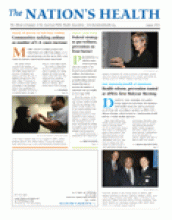Women who have had heart attacks lag behind their male counterparts when it comes to receiving treatment, according to a recent report.
In its 2011 “Women's Health in American Hospitals” report, released May 3, physician and hospital ratings group HealthGrades found significant gender disparities in cardiovascular care. Approximately one-third of female heart attack patients receive lifesaving surgical interventions, the report said, compared to one-half of male patients. Among all heart attack patients receiving interventions, women die at a 30 percent higher rate than men.
The report based its findings on an analysis of the hospital records of about 5 million Medicare patients between 2007 and 2009, measuring complications and mortality rates across 16 of the most common cardiovascular diagnoses and treatments.
Lack of awareness among women may contribute to the discrepancy in health outcomes, according to Mary Ann Bauman, MD, spokeswoman for the American Heart Association's Go Red for Women initiative and medical director for women's health and community relations at Integris Health in Oklahoma City.
“Only 54 percent of women understand that heart disease is the number one cause of death in women,” Bauman told The Nation's Health. “Women need to identify this as a disease that can happen to them.”
The report said women should familiarize themselves with woman-specific warning signs of a heart attack, noting that most women suffering from a heart attack have no chest pain. Often, women experience atypical symptoms prior such as abdominal pain, sleep disturbance, anxiety, lightheadedness and jaw pain.
Bauman said that type of knowledge is critical to lowering mortality rates for women.
“As we increase awareness about heart attack and stroke, we'll be able to get them to the hospitals sooner, and we can have more timely interventions,” she said.
But Bauman said interventions that occur after the fact are never ideal. Rather, the goal should be to prevent people from having heart attacks in the first place. To that end, she said, health care providers should help patients understand their risk factors.
“Doctors pay attention to blood pressure and cholesterol, but we need patients to pay attention to the things they can control: weight, fat intake, exercise,” she said.
Based on the findings, HealthGrades awarded 170 out of the 5,000 hospitals in the report the Women's Health Excellence Award. Compared to hospitals that did not receive the distinction, female patients at the Women's Health Excellence hospitals had a 40.6 percent lower mortality rate for cardiac, pulmonary and vascular procedures.
The report is available online at www.healthgrades.com.
- Copyright The Nation’s Health, American Public Health Association









